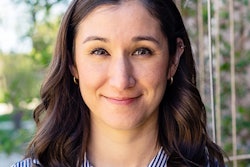Title: Assistant Professor, Department of History, Drexel University, Jointly Appointed, History and Africana Studies, Drexel University
Tenured: No
Age: 42
Education: B.A., political science, University of California at Irvine; B.A., Asian American studies, University of California at Irvine; M.A., American studies and ethnicity, University of Southern California; and Ph.D., American studies and ethnicity, University of Southern California
Career mentors: Dr. Nayan Shah, University of Southern California; Dr. Lundy Braun, Brown University; and Dorothy Roberts, University of Pennsylvania
History speaks loudly through Dr. Nic John Ramos, whose research on the histories of minoritized communities aims to amplify their oft-marginalized voices.
Ramos, jointly appointed in History and Africana Studies, serves as an assistant professor in the Department of History at Drexel University in Philadelphia. The professor first pursued collegiate study and research pertaining to poor people of color and queer and trans people — persons who were familiar to Ramos in appearance and life experience.
“It felt good to see other people who looked and felt like me,” recalls Ramos. “Deep down, I knew that seeing other people researched as serious subjects and as real actors reflected in history meant that, somehow, I too was being seen. That feeling — at least for me — did not last forever. Nowadays, I continue to do research because it’s not enough to do research to be seen but to do work that helps people understand and grapple with power.”
Ramos studies the history of race, sexuality, and capitalism, conveying perspectives on and increasing understanding of the origins of existing power structures.
“My hope is my work contributes to helping people change the dynamics of power that underlie the processes of marginalization that account for the invisibility in the first place,” says Ramos.
The historian grew up in multi-racial, working- and middle-class neighborhoods and communities thronged with military families like Ramos’.
“My father was recruited into the Navy when other Filipino men like him could not take certain jobs in the military,” says Ramos. “My mother, despite her college degree, could not get the job she was qualified for in the hospital that she worked in for more than 15 years.”
The experiences inspired years of continued advocacy work for underserved and overlooked groups in the workforce and elsewhere.
“Seeing the job and class discrimination my immigrant parents faced encouraged me to become a union organizer for six years before becoming an academic,” explains Ramos. “I helped all sorts of hospital workers – from resident physicians to nurses to respiratory therapists to phlebotomists to food service and environmental service workers (janitors and housekeepers) – form their unions for better pay, working conditions, and benefits.”
The scholar just six years out of graduate school has already exhibited an extraordinary leadership in the field, according to Dr. Leslie Ashburn-Nardo, vice provost for Diversity, Equity and Inclusion in the Office of the Provost at Drexel. Ramos recently served as a Ford Postdoctoral Fellow in the Program on Race, Science, and Society at the University of Pennsylvania and as the Mellon Postdoctoral Fellow of Race in Science and Medicine at Brown University’s Center for the Study of Slavery and Justice, the Department of Africana Studies, and the Cogut Institute.
Ashburn-Nardo nominated Ramos for recognition as an Emerging Scholar. She says she feels “responsible for lifting up examples of inclusive excellence, and Dr. Ramos’ work is a great example.”
Ramos’ latest project explores how the distribution of healthcare services revolves around ideas of labor and real estate.
“If healthcare is about labor, then all healthcare is about real estate,” observes Ramos. “On the same token, if labor in the United States is gendered and racialized, then all healthcare is structured by whiteness and patriarchy. We live in a society where you have to work to stay healthy, which means that it’s easy to lose or not have healthcare when you don’t have a job, or you get sick.”
Ramos’ book manuscript project, Health as Property: Making Poverty, Race, and Sexuality Productive in Global Los Angeles, 1965-1986, examines the development of new public health institutions as economic development programs in the late 20th Century. The project contributes, in part, to new perspectives on the history of race, sexuality, capitalism, and new medical knowledge by bridging the fields of political economy with Black feminism, “queer of color” history, and disability studies.
Ramos publishes works that challenge the status quo “and all of us who intentionally or unintentionally reinforce it,” says Ashburn-Nardo.
“Dr. Ramos is a great example of a transformational, inter-disciplinary scholar, combining the perspectives of multiple disciplines to address critical societal challenges,” says Ashburn-Nardo. “Their work helps make society a better place.
“I encourage Dr. Ramos to stay true to their guiding principles,” she continues. “All too often, especially after some successes early in our careers, we feel pressured to change who we are to fit others’ narratives, but Dr. Ramos’ scholarship provides a needed voice for multiple marginalized peoples.”















